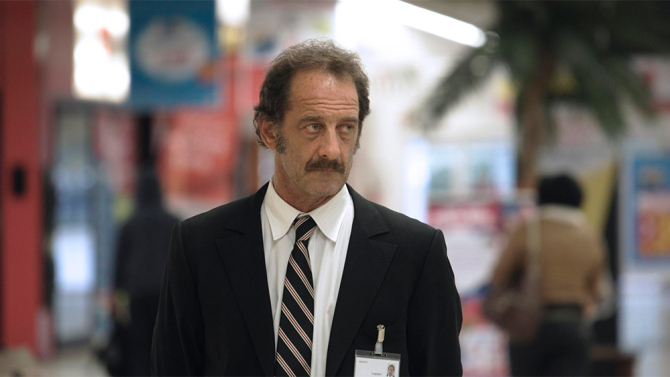
Like Bicycle Thieves’ Antonio Ricci (Lamberto Maggiorani) almost seventy years before him, Thierry Taugourdeau (Lindon) the protagonist of The Measure of a Man, is simply trying to earn an honest living to support his family. He has been unemployed for well over a year and must make ends meet with a small unemployment check. He spends most of his days trying to find a job, and at night he puts on his best face to appease the fears of his wife (Karine de Mirbeck) and his teenage son (Matthieu Schaller) who has a disability that will require special education in the near future. While Thierry’s overall situation is absolutely lamentable, there is no “time bomb” outlook in the meditative film, rather than push this everyman into “Michael Douglas in any 90s thriller” mode, director Stephane Brize invites us to observe and perhaps develop empathy.
Thierry is both unique and one of many like him who lose their jobs on a daily basis. After being laid off from a factory, along with hundreds of others who we never see, we understand that Brize’s film is touching on a larger sociological phenomenon, without losing the insight that comes from a particular case. This balancing act between the specific and the universal is handled by Brize with elegant tenderness and passionate impotence; how have we allowed our society to become this?
Halfway through the film, and this is not a spoiler, Thierry finds a job as an inspector at a large supermarket where he must confront people who shoplift. Considering this isn’t Chanel or Dior, the items being purloined range from meat to “loyalty points” a cashier adds to her own personal card. We understand Thierry knows the poverty that forces these people to commit such acts, but then the film poses another question: is Thierry’s loyalty to his economic needs or his humanity.
Towering over almost every other actor in the film, Lindon gives a performance of such subtle power that you often ask yourself if he’s even “acting”. Seeing the pain in Thierry’s eyes, as Brize’s immovable camera pierces into the souls of people who must explain they can’t afford to pay for that piece of food they put in their pockets, is at times even harder to look at than the goriest Hollywood trick. Brize knows that the film won’t be able to solve the problems it exposes, and those looking for “entertainment” will certainly not be pleased with this feature, but as a window into the social realism perpetuated by the Dardennes, Bresson, De Sica and Rossellini, The Measure of a Man poses one pithy question: will we look out, or will we close the blinds when the view gets too hard to handle.
The Measure of a Man is now in theaters.